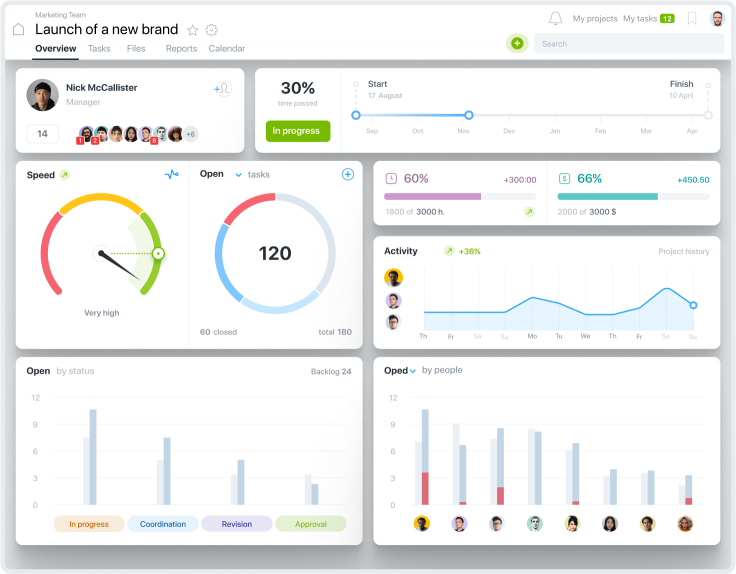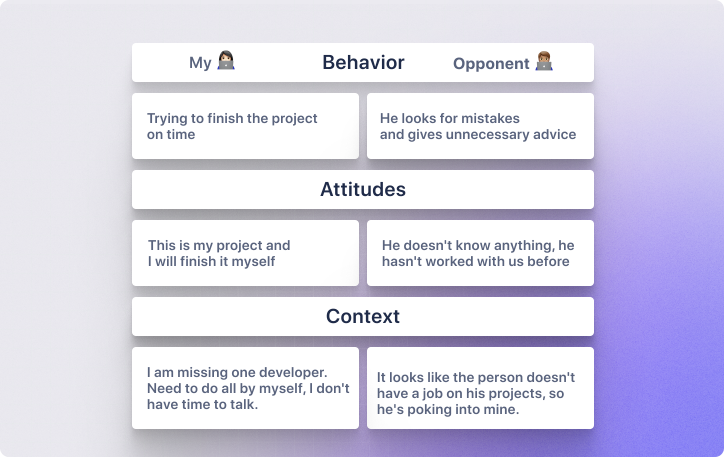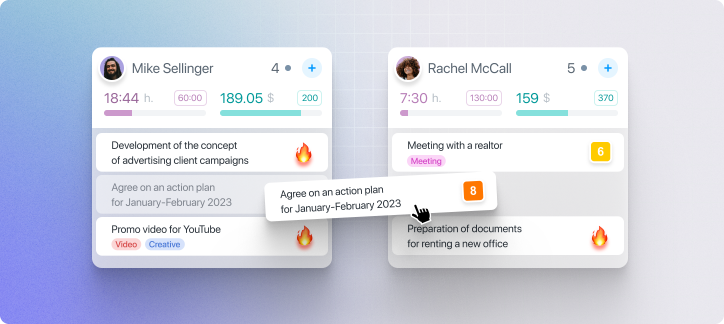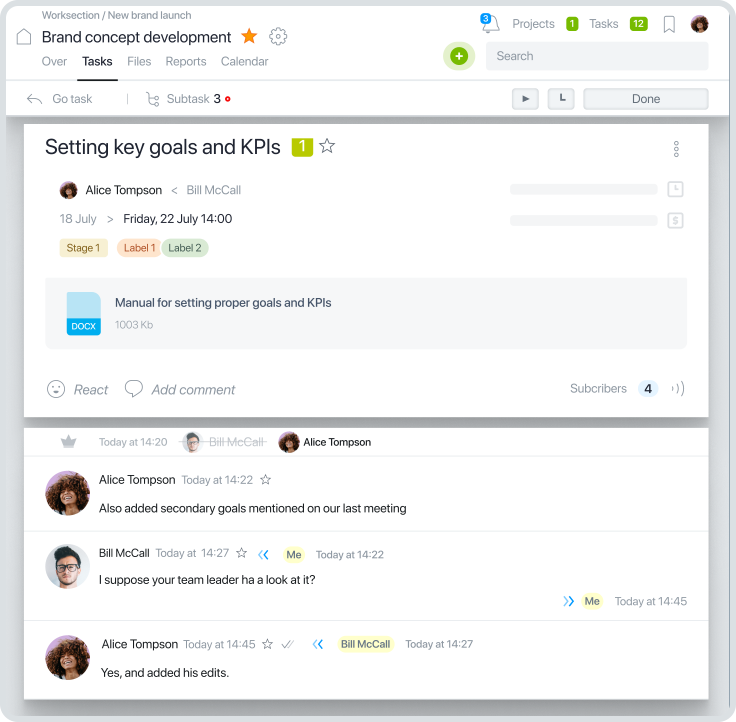A truly successful team understands its tasks and their importance, can maintain focus, efficiency and creativity for a long time, and enjoys the work itself and the end result. Team management is of great importance in building such a team, thanks to which employees feel their value and work harmoniously.
Sometimes, due to heavy workload, the manager does not have enough resources to monitor the state of the team and build a management strategy. In this article we will tell you a few secrets to optimize this important part of the work.
Project Team Management
A team is a group of employees who are united to perform one or more tasks and achieve the goals set at the beginning of the work. Practice shows that team work in most cases gives the best result, because even a very high-level specialist gets stronger when he works with other people.
Team management is one of the most important complex skills of a manager. This work consists of the following processes:
- setting goals and communicating them to the team;
- motivation and inspiration;
- regular communication and feedback;
- demonstration of a personal example of effective problem solving;
- resolving conflicts and creating a healthy team atmosphere, a good corporate culture;
- expanding possibilities for the team’s professional growth.
Why is Team Management Important
The basis of a successful business is an engaged, interested and motivated team. In other words, a “healthy” team.

A team of employees will not become such on their own, therefore, attention should be paid to building a “dream team”, where every participant enjoys work and opportunities for growth. This combination will be an important factor in employee retention.
A few statistics that confirm the importance of managing a team and building relationships within it. For example, teams with high employee engagement are 23% more profitable than others. In addition, they have the following positive differences:
- 10% higher customer loyalty;
- 14% higher productivity;
- 18% better sales.
13 Secrets of Effective Project Team Management
Gallup states, there are 12 key needs, which have to be satisfied through team management. If they are all met, team productivity will be high.
- The employee knows what is expected of him.
- The employee has everything necessary for fruitful work: materials, equipment, etc.
- Partners and colleagues are committed to quality work.
- There is a person in the team who promotes growth and self-improvement.
- Over the past six months, someone has discussed his progress with the employee.
- Every working day, a person has the opportunity to do what he does best.
- The manager or colleagues take care of the employee’s personal requests.
- At least once a week, a person receives a favorable assessment of his work.
- The employee has a friend in the team.
- During the year, the employee had the opportunity to learn and grow.
- A person’s opinion is taken into account by the team and management.
- The company’s mission and/or the project’s purpose makes the employees feel that the work is really important.
To meet all these needs, you need to know the secrets of effective team management.
Team Building Approaches
First of all, you must have a strategy that will help you hire, adapt and retain the best employees who can effectively solve the project’s tasks.
Selecting team members
It’s worth starting with setting clear goals. For example, you need to build a team that will include a marketing manager, developers, testers, designers and specialists in setting up contextual ads. Mark the following:
- how much time you have to search for specialists;
- what salaries you can offer;
- what the advantages of working in your project are;
- what resources you can use to search.
The following tips could also be useful:
- To hire strong employees, your employer brand must be strong. Explore the market value of your brand and adjust the information if necessary.
- More often you don’t need a team that consists entirely of “stars,” that is, Senior-level specialists. It is better to form a team so that there is one leader in each direction, other employees can be strong Middle and promising Junior.
- Adjust the size of the team. Sometimes it seems that the more people, the faster the project can be completed. This is not always the case, as a large number of workers creates even more interactions that get out of control. Most often, the optimal number of people in a team is up to five. If it is clear that the project requires a lot of resources, it is better to divide employees into micro-teams, each of which will have its own leader. It will also be necessary to establish regular synchronization of the work of the teams.
- Imagine that the candidates are your guests or customers. Treat them accordingly: respect their time, be hospitable, and stay in touch.
Teamwork planning
When you have a team, you need to plan your work together. It is advisable to draw up a plan for 6 – 12 months, with quarterly review and update, or maybe more often, taking into account the turbulent present.

To make your planning a success, include the following steps:
- Outline the vision of goals and objectives for the team as a whole and for each employee.
- Write down team and employee key performance indicators (KPIs).
- Set deadlines: midterm and final.
- Create an alternative plan in case of force majeure
Teamwork organization
For a coherent team it is necessary to build its hierarchy. That is, everyone should understand who a leader or a subordinate is. The number of levels in the hierarchy will depend on the complexity of the project and the number of employees.
The following items are also worth doing:
- jointly formulate the goal of the project that is clear to all;
- describe dependence between groups of employees on the way to achieving the goal;
- to understand who is responsible for what;
- ensure that all employees know what is expected of them.
Ensuring a common information field with the team
Nowadays, few people just want to work without understanding the strategic goal. Therefore, the team leader must create a single information field in which all employees will be, so that everyone understands their role and their contribution to the final result.

Project Dashboard in the Worksection
You also need to ensure that all team members have access to the same information. This is the only way to make truly team decisions. So, the manager’s tasks are to:- provide reliable information,
- create conditions for everyone to have access to information, for example, create knowledge bases or make a weekly newsletter with important materials and
- discuss information which is important for the team.
Development of the project team according to the life cycle
Any team goes through several development stages. The strategic success of such a team depends on the successful completion of every single one.
- Forming. The first stage of development, when the participants start to contact each other and get to know each other.
- Storming. A period when people get used to working together, learn about each other’s strengths and weaknesses, and resolve conflicts.
- Norming/Performing. A period of time when all processes and mechanics of work have been built, employees have adjusted to teamwork and systematically move towards the goal together.
- Reorganization. At this stage, the composition of the team or the distribution of responsibilities may change. This usually happens due to changes in tasks.
- Termination. When the project is complete, the team makes conclusions and decides how successful the work was. If everyone is satisfied, it is possible that the team will come to work together again on new projects.
Resolving conflicts in a project team
Conflicts and misunderstandings happen in any team. Most often, the manager has to deal with interpersonal and inter-team disputes.
In order to resolve the conflict, one must first understand who the conflict parties are. It is not always obvious. Therefore, the manager should pay attention to understand who is really in conflict and why, and also to find out who acts as a “support group” for each of the parties.
The use of the triangle developed by the conflict expert Christopher Mitchell will be beneficial. He believed that it is necessary to understand the attitudes, context and behavior of each of the participants.To get objective information, it is best to ask the parties to describe their vision of the situation.
For example, each conflict participant answers the following questions:

When the manager sees such filled-in tables from the parties, he will be able to find the real cause of the conflict and propose a solution. It is possible that the participants themselves will be able to look at the problem at a different point and see ways to achieve peace.
The main thing is not to silence conflicts and not to think that they will disappear by themselves.
«Time for video games»
Research demonstrates that new teams that played video games with each other for 45 minutes were 20% more productive than those who were doing traditional team building exercises instead.
Therefore, think of this format of interaction. It is better to choose simple games that can be installed both on a PC and on a smartphone.
«Happy hour»
In general, the term “happy hour” refers to a period of time when supermarkets, catering establishments or shops have attractive price offers. But such hours are no less important in project team management.
In team management this may mean that team members communicate informally with each other in their free time, increasing the level of trust in each other. Here are some universal ideas for how to spend a happy hour:
- Quizzes on cinema, music, company, etc.
- Would You Rather. This is a question of the type: “What would you choose: coffee or tea?”, “What would you choose: a movie or a book?”.
- Two truths and a lie. A person names three facts about himself, one of which is false.

Basic Methods of Team Management
They say that a team is only as good as its leader. So, if you want a team to show growth, your growth has to be on the top. Always remember the importance of these components of management.
It is worth balancing the amount of each style in the general management. That is, not all tasks can be delegated, and some employees do not need mentoring at all, it is enough to clearly outline what should be done and when.
Correct Prioritization
Do not tell employees that all tasks are equally important. A person cannot do everything at the same time. Therefore, it should be explained what is of strategic importance for the timely completion of the project or the company as a whole.
Accordingly, it is better to prioritize all tasks. It is optimal to do this with the help of the task manager. So each team member will understand what to tackle first, and what can be postponed for later. This will help to rationally distribute working time and prevent disruption of deadlines.
Task Delegation
The manager cannot and should not do the lion’s share of the work on his own. Therefore, it is necessary to delegate to colleagues what they are able to do.

Yes, you may need more time to explain the essence and stages of performing some tasks, guides and instructions should be written. But there are also advantages in delegation:
- the list of employee competencies is expanding;
- the manager has more time to solve strategic problems.
Implementation of Mentoring
This process is very important for strengthening the team. Both the learner and the mentor benefit. After all, when we share knowledge, we structure it in our heads and often find non-standard decisions for solving problems.
A person who has a mentor progresses quickly, because he does not have to go through a large number of incorrect or irrelevant methods. On the contrary, you can immediately learn how to do this or that as efficiently as possible.
At the same time, in the process of communication, team members with different qualification levels learn to ask questions, answer them correctly, and perceive a different point of view.
Team Communication
Without good communication, successful management of the project team is almost impossible. The main thing is to adjust it so that it is convenient for everyone.
For example, you can agree that non-urgent questions can be emailed. But items that require an immediate reaction should appear in the messenger.

Communication within a task in a Worksection
In addition, you can discuss that there are hours when a member of staff does not respond to messages because of meetings or urgent tasks.
Another useful thing would be a survey within the team. It can be dedicated to anything: from celebrating the New Year to choosing a new task manager. If you want the most honest answers, make the survey anonymous and inform your employees about that.
Usually, the management of the project’s team and communications falls on the manager, but to optimize these processes, do not forget about feedback in the team.
Situational Management of the Project Team
It must be clear that strict adherence to management rules does not always work. Sometimes it is better to be guided by the principles of situational leadership, which take into account the difference between situations and employees.
This is the essence of this approach. Depending on the situation, you can choose one of four styles of behavior.
Directive It is assumed that the manager clearly says what should be done and by whom, with direct instructions and specified deadlines. This style is appropriate when you are teaching a new employee so that he does not make mistakes.
Tutorial The manager gives the employee a task and explains in general terms what should be obtained as a result. As the work progresses, the mentor gives advice, and at the end — a detailed feedback on the result and applied methods.
Supporting This style is appropriate when the manager is sure that the employee has all the necessary skills for the high-quality performance. Therefore, his participation is limited to periodically asking if help is needed and what kind.
Delegation If you know that a person has everything necessary to successfully complete a task, but is not sure about his abilities, then it is worth saying that this is now his area ofresponsibility. The manager does not control the work in progress, but answers questions and checks the result.
Creating an Effective Team
Above, we have already described the general principles of team formation. Let’s pay attention to some more details.

Evaluation criteria for candidates to the project team
Of course, each project has its own characteristics, and accordingly, the requirements for employees will differ significantly. But there are basic points for evaluating candidates:
- Нard skills. These are, in fact, skills allowing a person to do his job. If we talk, for example, about a tester, then he should know the principles of manual and automated testing, system specifications, bug trackers, programming languages, etc
- Soft skills. The following things are important in teamwork:
- the ability to communicate without interrupting, to argue one’s opinion;
- skills to deal with stress;
- openness and desire to learn;
- healthy reaction to criticism.
- Experience. Not all roles can be taken by newcomers and trained for a particular project. Sometimes you need to start the work quickly and complete it within a certain period, so you will not do without relevant experience.
- Motivation. Recruiters often ask why a person wants to work on this particular project. And earnings are far from the only motivation. Some want to gain new experience, while others are attracted by the opportunity to study or to solve social problems.
Rules that will help you create an effective team
First of all, make a good job description, so that the candidates understand exactly how well they suit you. Specify what is required and what is preferred.
Remember the following:
- Prepare test tasks. They will help to see how well the candidate has done the job, while a potential employee himself will understand whether he is interested in this position and whether it is up to him.
- Conduct one to three interviews with the candidate. But try not to prolong them in time.
- Focus on onboarding and write adequate job instructions. If a person feels that he does not know anything and that no one needs him in the first days, he may quit or work inefficiently. Instead, ready-made instructions can make many processes easier.
Things you cannot manage a project team without
If you do not have a clear understanding of the team’s goals and the criteria for measuring its performance, you should not expect successful work. There are also the following important factors.
The importance of choosing a project team management tool
Practice shows that paper blocks, Word files and Excel sheets work only in very small teams with a small number of simple tasks. When it comes to serious projects and solid customers, you should use the following tools:
- A time tracker, to track the time spent on particular tasks. If the project has an hourly payment, it cannot be done without it at all.
- A task tracker. When there are more tasks and performers, it is difficult to keep in mind who is responsible for what. Therefore, it is better to have a service in which the tasks, responsible persons and the deadlines are clearly defined. If you want to have a project overview, understand the status of tasks and respond to any changes in a timely manner, it is worthwhile to integrate a project management system into your work. You can start with an inexpensive basic tariff, and then, as the company grows, make upgrades.
Things to be avoided
Effective management of the project team is impossible if communications between all participants are not established. Such things should also be avoided:
- Confidence that the customer knows what he wants. Usually, he knows what goal he wants to achieve. For example, $10,000 monthly sales. But it is unlikely that the customer knows which hosting is better and what the difference between SEO promotion and targeted advertising is. Be ready to explain patiently and discuss a lot.
- Hope that any mistake can be corrected. Actually, it can. But won’t this mistake be too expensive for you?
- Counting on the fact that your previous success is a guarantee of your future achievements. Yes, experience counts a lot. But if you rely on it only, you can make mistakes. Therefore, always be aware of new trends.
Tips for beginners in project management
If you use the tips described above in your company, make sure to measure their effectiveness. To do this, pay attention to the following indicators:
- an increase in the overall level of team satisfaction;
- absence of exceeding planned budget indicators;
- reducing the overtimes;
- timely completion of projects;
- high level of satisfaction with work results among customers.
This is important, because there are no methods and tips that are perfect for absolutely all teams. Therefore, it is necessary to constantly keep your finger on the pulse of the team’s performance.
In order to implement effective and successful management of the project team, you need not only to know the secrets and rules of this process, but also to constantly test the information you know and look for new options for improving the process. In addition, it is worth using project management tools and analyzing key performance indicators of the team.
